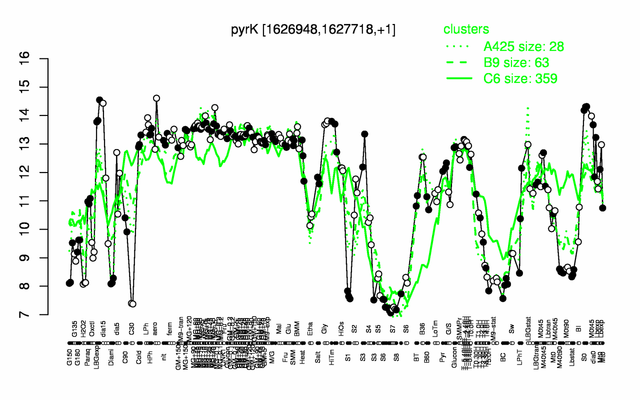Difference between revisions of "PyrK"
| Line 118: | Line 118: | ||
* '''Additional information:''' | * '''Additional information:''' | ||
** belongs to the 100 [[most abundant proteins]] {{PubMed|15378759}} | ** belongs to the 100 [[most abundant proteins]] {{PubMed|15378759}} | ||
| + | ** number of protein molecules per cell (minimal medium with glucose and ammonium): 201 {{PubMed|24696501}} | ||
| + | ** number of protein molecules per cell (complex medium with amino acids, without glucose): 1096 {{PubMed|24696501}} | ||
=Biological materials = | =Biological materials = | ||
Revision as of 09:52, 17 April 2014
- Description: dihydroorotic acid dehydrogenase (electron transfer subunit)
| Gene name | pyrK |
| Synonyms | pyrDII, ylxD |
| Essential | no |
| Product | dihydroorotic acid dehydrogenase (electron transfer subunit) |
| Function | pyrimidine biosynthesis |
| Gene expression levels in SubtiExpress: pyrK | |
| Metabolic function and regulation of this protein in SubtiPathways: pyrK | |
| MW, pI | 27 kDa, 5.582 |
| Gene length, protein length | 768 bp, 256 aa |
| Immediate neighbours | pyrAB, pyrD |
| Sequences | Protein DNA DNA_with_flanks |
Genetic context 
This image was kindly provided by SubtiList
| |
Expression at a glance PubMed
| |
Contents
Categories containing this gene/protein
biosynthesis/ acquisition of nucleotides, most abundant proteins
This gene is a member of the following regulons
The gene
Basic information
- Locus tag: BSU15530
Phenotypes of a mutant
Database entries
- BsubCyc: BSU15530
- DBTBS entry: [1]
- SubtiList entry: [2]
Additional information
The protein
Basic information/ Evolution
- Catalyzed reaction/ biological activity:
- Protein family: FAD-binding FR-type domain (according to Swiss-Prot)
- Paralogous protein(s):
Extended information on the protein
- Kinetic information:
- Modification:
- Cofactors: contains an iron-sulfur cluster
- Effectors of protein activity:
Database entries
- BsubCyc: BSU15530
- Structure:
- UniProt: P25983
- KEGG entry: [3]
- E.C. number:
Additional information
Expression and regulation
- Regulatory mechanism:
- PyrR: RNA switch, transcription termination/ antitermination (in the presence of uridine nucleotides: termination, in their absence: antitermination) PubMed
- Additional information:
- belongs to the 100 most abundant proteins PubMed
- number of protein molecules per cell (minimal medium with glucose and ammonium): 201 PubMed
- number of protein molecules per cell (complex medium with amino acids, without glucose): 1096 PubMed
Biological materials
- Mutant:
- Expression vector:
- lacZ fusion:
- GFP fusion:
- two-hybrid system:
- Antibody:
Labs working on this gene/protein
Your additional remarks
References